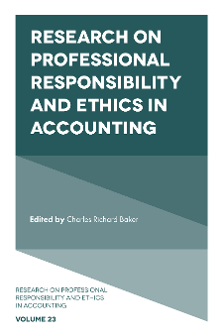
Index
Research on Professional Responsibility and Ethics in Accounting
ISBN: 978-1-83867-670-4, eISBN: 978-1-83867-669-8
ISSN: 1574-0765
Publication date: 16 October 2020
Citation
(2020), "Index", Baker, C.R. (Ed.) Research on Professional Responsibility and Ethics in Accounting (Research on Professional Responsibility and Ethics in Accounting, Vol. 23), Emerald Publishing Limited, Leeds, pp. 193-198. https://doi.org/10.1108/S1574-076520200000023011
Publisher
:Emerald Publishing Limited
Copyright © 2020 Emerald Publishing Limited
INDEX
Index
Note: Page numbers followed by “n” indicate end notes.
- Prelims
- Chapter 1: Understanding Professional Skepticism Through an Ethics Lens: A Research Note
- Chapter 2: CSR Performance: Governance Insights from Dual-Class Firms
- Chapter 3: Will Cognitive Style Impact Whistleblowing Intentions?
- Chapter 4: Do American Accounting Students Possess the Values Needed to Practice Accounting?
- Chapter 5: Increasing Student Engagement Using Giving Voice to Values and Peer Feedback
- Chapter 6: Law Versus Ethics in Accounting
- Chapter 7: Socialization and Professionalism
- Chapter 8: A Comparative Study of the Whistleblowing Activities: Empirical Evidence from China, Taiwan, Russia, and the United States
- Chapter 9: Earnings Management Ethics: Stakeholders’ Perceptions
- Chapter 10: An Evaluation of Methods for Teaching Auditing Students Auditor Independence Compliance Rules
- Index